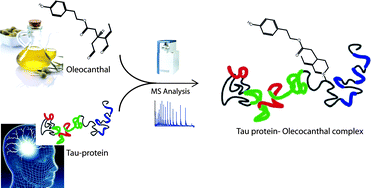Researchers from Fisciano, Italy, have provided new insights into the mechanism of interaction between tau proteins and the extra-virgin olive oil component oleocanthal (OLC). Extra-virgin olive oil is the primary source of fat in the Mediterranean diet, and is widely associated with a variety of health benefits. The olive oil phenolic compound OLC has attracted great interest due to the suggestion it could be involved in modulating diseases such as inflammation and Alzheimer’s.
 Fibrillization of Tau protein is one of the leading causes of Alzheimer’s disease and OLC has been shown to halt this process. Understanding how this compound interacts with tau protein and prevents fibrillization could prove to be crucial in the fight against Alzheimer’s.
Fibrillization of Tau protein is one of the leading causes of Alzheimer’s disease and OLC has been shown to halt this process. Understanding how this compound interacts with tau protein and prevents fibrillization could prove to be crucial in the fight against Alzheimer’s.
In this study, it was shown that OLC irreversibly modifies tau protein via covalent modification of the tau protein fibrillogenic fragment K18, thus preventing its fibrillization. This occurs through Schiff base formation between the 3-amino group on the lysine residues of tau protein and the carbonyl groups of OLC in a 1:1 stoichiometry.
To find out more read the article in full for free; follow the link below
Maria Chiara Monti, Luigi Margarucci, Alessandra Tosco, Raffaele Riccio and Agostino Casapullo, Food Funct., 2011, DOI: 10.1039/c1fo10064e










